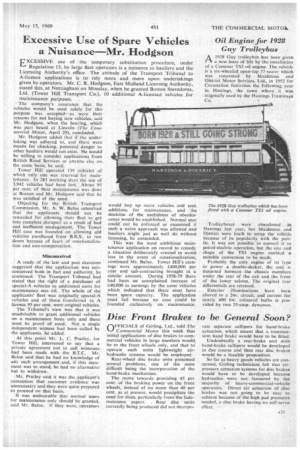Excessive Use of Spare Vehicles a Nuisance Mr. Hodgson
Page 33

If you've noticed an error in this article please click here to report it so we can fix it.
EXCESSIVE use of the temporary substitution procedure, under
Regulation 15, by large fleet operators is a nuisance to hauliers and the Licensing Authority's office. The attitude of the Transport Tribunal to A-licence applications is to rely more _and more upon undertakings given by operators. Mr. C. R. Hodgson, East Midland Licensing Authority, stated this, at Nottingham on Monday, when he granted Boston Stevedores, Ltd. (Tower Hill Transport Co.), 10 additional A-licensed vehicles ,for maintenance purposes.
The company's assurance that the vehicles would be used solely for this purpose was accepted—as were their reasons for not buying new vehicles, said Mr. Hodgson, when the hearing, which was part heard at Lincoln (The Commercial Motor, April 29), concluded.
Mr. Hodgson added that if the undertaking was adhered to, and there were means for checking, potential danger to other hauliers would not exist. He would be willing to consider applications from British Road Services or anyone else on. the same basis, he said.
Tower Hill operated 139 vehicles of which only one was reserved for maintenance. In 283 working days the use of 3.942 vehicles had been lost. About 95 per cent. of their maintenance was done at Boston and Mr. Hodgson said that he was satisfied of the need.
Objecting for the British Transport Commission, Mr. A. W. Balne submitted that the applicants should not be rewarded for allowing their fleet to get into complete disrepair as a result of bad and inefficient management. The Tower Hill case was founded on allowing old vehicles purchased from B.R.S.. to run down because of fears of renationalization and non-compensation.
Misconceived
A study of the law and past decisions suggested that the application was misconceived both in fact and authority, he continued. The Transport Tribunal had stated that the right of a purchaser of special-A vehicles to additional units for maintenance was nil. The whole of the applicants' fleet was originally special-A vehicles and of those transferred to A licence 95 per cent. were original vehicles.
The Tribunal's view was that it was unadvisable to grant additional vehicles on a maintenance basis only and there must be proof of need. Not a single independent witness had been called by the applicants, he added.
At this point Mr. L. C. Pratley, for Tower Hill, intervened to say that a private agreement not to call witnesses had been made with the B.T.C. Mr. Balne said that he had no knowledge of any such arrangement and, if this statement was to stand, he had no alternative hut to withdraw.
Mr. Pratley said it was the applicant's contention that customer evidence was unnecessary and they were quite prepared to proceed on that basis.
It was undesirable that normal users for maintenance only should be granted, said Mr. Balne. If they were, operators
would buy up more vehicles and seek additions for maintenance, and the doctrine of the usefulness of obsolescence would be established. Normal user could not be enforced or examined if such a naive approach was allowed and hauliers might just as well do without licensing, he contended.
This was the most ambitious maintenance application on record to remedy a situation deliberately created to avoid loss in the event of renationalization, continued Mr. Balne. Tower Hill's earnings were approximately £400,000 per year and sub-contracting brought in a similar amount. During 1958-59 there had been an unexplained increase of £40,000 in earnings by the same vehicles which indicated that there must have been spare capacity. The application must fail because no case could be founded exclusively on maintenance.




































































































